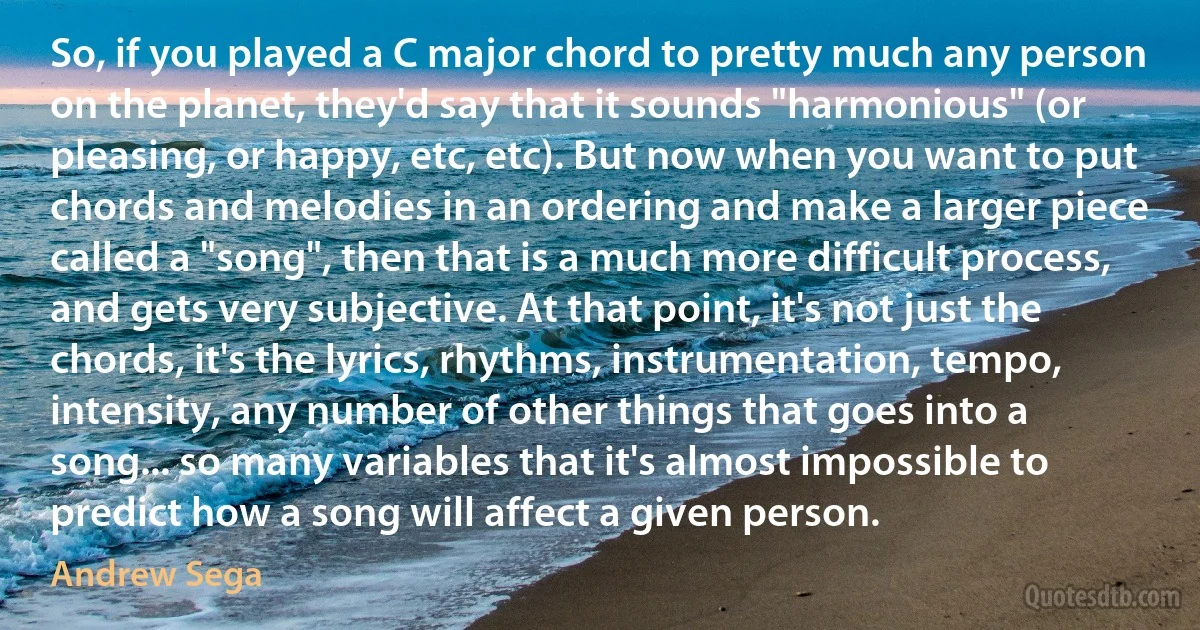Ordering Quotes - page 4
Further, economic systems ... have never arranged themselves by themselves. It is men who do the ordering according to their attitudes, desires and understanding of things. Changes take place, not independent of man's will, but on account of man's wills. Civilization has progressed by man's interference with material conditions.

Goparaju Ramachandra Rao
A time series is a sequence of observations, usually ordered in time, although in some cases the ordering may be according to another dimension. The feature of time series analysis which distinguishes it from other statistical analysis is the explicit recognition of the importance of the order in which the observations are made. While in many problems the observations are statistically independent, in time series successive observations may be dependent, and the dependence may depend on the positions in the sequence. The nature of a series and the structure of its generating process also may involve in other ways the sequence in which the observations are taken.

Theodore Wilbur Anderson
This Conference:... (3) recognises that there are among us persons who experience themselves as having a homosexual orientation. Many of these are members of the Church and are seeking the pastoral care, moral direction of the Church, and God's transforming power for the living of their lives and the ordering of relationships. We commit ourselves to listen to the experience of homosexual persons and we wish to assure them that they are loved by God and that all baptised, believing and faithful persons, regardless of sexual orientation, are full members of the Body of Christ; (4) while rejecting homosexual practice as incompatible with Scripture, calls on all our people to minister pastorally and sensitively to all irrespective of sexual orientation and to condemn irrational fear of homosexuals.

Peter Akinola
The uniting of Orthodoxy with state absolutism came about on the soil of a non-belief in the Divineness of the earth, in the earthly future of mankind; Orthodoxy gave away the earth into the hands of the state because of its own non-belief in man and mankind, because of its nihilistic attitude towards the world. Orthodoxy does not believe in the religious ordering of human life upon the earth, and it compensates for its own hopeless pessimism by a call for the forceful ordering of it by state authority.

Nikolai Berdyaev
On the independence of irrelevant alternatives: Morgenbesser, ordering dessert, is told by the waitress that he can choose between apple pie and blueberry pie. He orders the apple pie. Shortly thereafter, the waitress comes back and says that cherry pie is also an option; Morgenbesser says "In that case I'll have the blueberry pie."

Sidney Morgenbesser
Collections of all twelve pitch classes can be differentiated from one another only by assigning an order to the pitch classes or by partitioning them into mutually exclusive sub-collections. The ordering principle is the basis of the twelve-tone system formulated by Schoenberg, the partitioning principle the basis of the system formulated around the same time by Hauer. In Schoenberg's compositional practice, however, the concept of a segmental pitch-class content is represented as well, as a basis for the association of paired inversionally related set forms. On the relation between Schoenberg and Hauer see Bryan R. Simms, "Who First Composed Twelve-Tone Music, Schoenberg or Hauer?" Journal of the Arnold Schoenberg Institute X/2 (November 1987).

George Perle
In your calm bosom have made their dwelling a dignity that charms and virtue gay yet weighty. Not for you lazy repose or unjust power or vaulting ambition, but a middle way leading through the Good and the Pleasant. Of stainless faith and a stranger to passion, private while ordering your life for all to see, a despiser too of gold yet none better at displaying your wealth to advantage and letting the light in upon your riches.

Statius
They were not seduced by the French fallacy that a new system of government could be ordered like a new suit of clothes. They would as soon have thought of ordering a new suit of flesh and skin. It is only on the roaring loom of time that the stuff is woven for such a vesture of their thought and experience as they were meditating.

James Russell Lowell
At what price have so many of us come to believe that the economy is the realm of natural order and that the legitimate and competent sphere of policing-of administration and government-lies elsewhere? What flows from that sharp dichotomy between orderliness in the market and ordering in the penal sphere? At what price do we embrace these categories? And here, the answer is equally clear: at the price, first, of naturalizing the market and thereby effectively shielding from normative assessment the regulatory mechanisms in our contemporary markets and the wealth distributions that occur daily; and at the price, second, of easing, facilitating, and enabling the massive expansion of our penal sphere, or, to be more provocative, of making possible mass incarceration today.

Bernard Harcourt
The doctrine of laissez-faire in the mid-nineteenth century essentially allowed three functions for the government: first, maintaining the external defense of the country; second, providing for the internal order and security of persons; and third, possibly, providing for minimal public amenities. ... Criminalization and punishment became, undisputedly, the most legitimate and competent task of the government. There, for sure, government intervention was proper, necessary, legitimate, and competent. There, natural orderliness had to be replaced by governmental ordering.

Bernard Harcourt
Theism (whether Christian, Jewish, or Muslim) holds that God by wisdom created the world. The origin of the world and its subsequent ordering thus results from the designing activity of an intelligent agent-God. Naturalism, on the other hand, allows no place for intelligent agency except at the end of a blind, purposeless material process. Within naturalism, any intelligence is an evolved intelligence. Moreover, the evolutionary process by which any such intelligence developed is itself blind and purposeless. As a consequence, naturalism makes intelligence not a basic creative force within nature but an evolutionary byproduct. In particular, humans (the natural objects best known to exhibit intelligence) are not the crown of creation, not the carefully designed outcome of a purposeful creator, and certainly not creatures made in the image of a benevolent God. Rather, humans are an accident of natural history.

William A. Dembski
There's nothing like spending other peoples money, Gordon and Tony discovered this very quickly, and have been going crazy, ordering off the menu ever since. Tony quickly exited the restaurant, leaving Gordon footing the bill, and thats why we're in the mess we're in now. Meanwhile Tony's laughing all the way to the bank where his £14 million is sitting pretty. It's just disgraceful behaviour and ordinary people are suffering because of the megalomania of those two crooks.

Munir Butt
Physics is to be regarded not so much as the study of something a priori given, but rather as the development of methods of ordering and surveying human experience. In this respect our task must be to account for such experience in a manner independent of individual subjective judgement and therefore objective in the sense that it can be unambiguously communicated in ordinary human language.

Niels Bohr
The validity of demonstrably wrong law cannot conceivably be justified. However, any answer to the question of the purpose of law other than by enumerating the manifold partisan views about it has proved impossible- and it is precisely on that impossibility of any natural law, and on that alone, that the validity of positive law may be founded. At this point relativism, so far only the method of our approach, enters our system as a structural element.
Ordering their living together cannot be left to the legal notions of the individuals who live together, since these different human beings will possibly issue contradictory directions. Rather, it must be uniformly governed by a transindividual authority. Since, however, in the relativistic view of reason and science are unable to fulfill that task, will and power must undertake it. If no one is able to determine what is just, somebody must lay down what is to be legal.

Gustav Radbruch
My skepticism concerning all notions of reconquista is skepticism toward the view that history is restorative. I get older but I do not grow wiser. It is only by shedding skin, by turning pages, by ordering stronger spectacles, by having my hair cut, that I seem to be restoring myself to a circular pattern, that I seem to progress toward youth and capability, though my progress is actually a decline.

Richard Rodriguez
Veterans of every war suffer Battered Man Syndrome in the form of posttraumatic stress disorder. The emotional consequences are also with them for years. But if a sufferer killed Admiral Zumwalt for ordering the spraying of Agent Orange, he would be convicted for murder. Men who suffer Battered Man Syndrome are not allowed to attack their abuser and call it self-defense.

Warren Farrell



